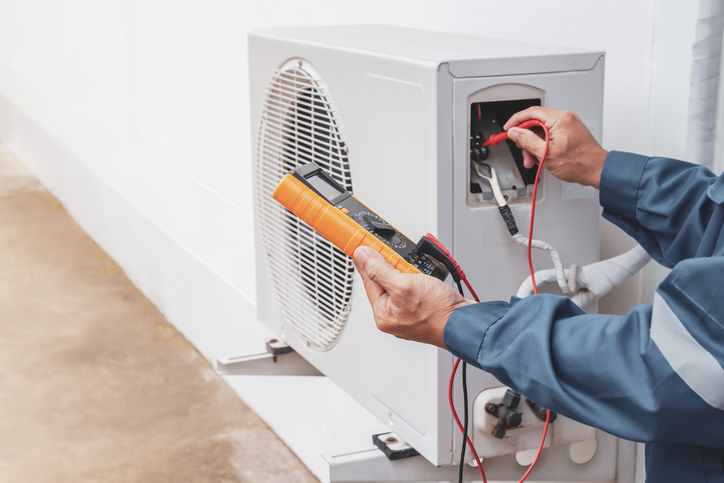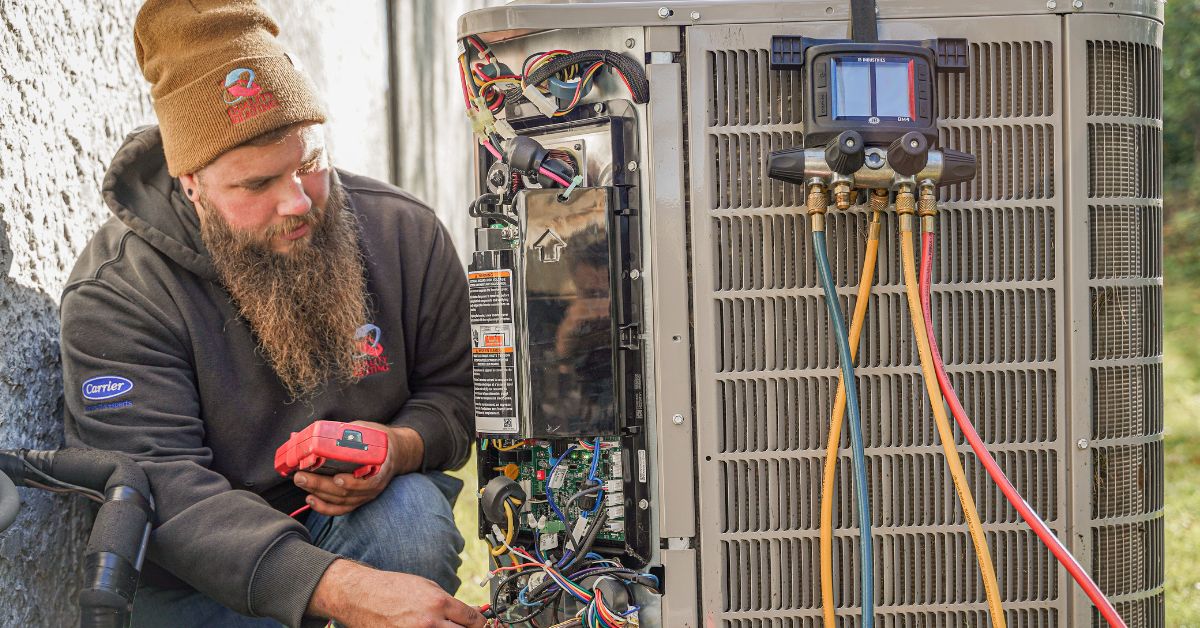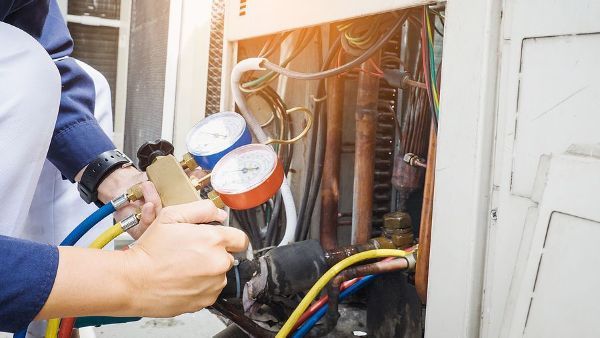All About HVAC: Identifying Common Issues and Effective Air Conditioning Repair Work Techniques
A/c systems are important for preserving indoor comfort. Understanding their parts and capability is crucial for recognizing typical issues. Homeowners often encounter troubles such as inefficient air conditioning, odd odors, or rising power expenses. These signs can show underlying concerns that may call for attention. Checking out DIY troubleshooting strategies can be helpful, but recognizing when to look for professional aid is similarly important. What actions can be taken to assure lasting performance?
Comprehending Your Heating And Cooling System: Elements and Performance
A cooling and heating system, commonly thought about the foundation of interior environment control, includes numerous essential parts that interact to manage temperature and air top quality. The main components consist of the heating device, ventilation system, and a/c device. The home heating device, generally a heater or boiler, generates heat during chillier months, while the cooling device cools down indoor areas during the summertime.

Typical A/c Problems Home Owners Experience
Homeowners usually encounter a number of usual a/c problems, consisting of inconsistent temperature level distribution throughout their living areas. Additionally, uncommon noises during procedure can indicate underlying concerns that require attention. Attending to these concerns immediately is important for keeping ideal system efficiency.
Irregular Temperature Distribution
Several homes experience the discouraging issue of inconsistent temperature level circulation, where certain areas really feel uncomfortably warm while others continue to be also cold. This issue usually occurs from a range of variables, including poor insulation, obstructed vents, or a poorly sized HVAC system. When ducts are not appropriately secured or when furniture obstructs air flow, some spaces might obtain insufficient cooling. In addition, thermostat positioning can greatly affect temperature level regulation; a thermostat situated in a sunlit location might misstate the total temperature of your home. Routine maintenance, including cleaning filters and making sure ductwork is clear, can aid reduce these inconsistencies. Home owners might additionally take into consideration zoning systems to far better control temperature levels throughout various locations of the home, advertising a much more comfy living atmosphere.
Unusual Noises During Operation
When a heating and cooling system operates, unusual sounds can show underlying concerns that call for interest. Home owners might come across a series of sounds, such as grinding, squealing, or hissing. Grinding sounds commonly indicate worn-out bearings or components, while squealing can recommend loose belts or parts requiring lubrication. Hissing might indicate a refrigerant leakage, which can jeopardize the system's effectiveness. Additionally, banging noises may direct to loose ductwork or an issue with the blower fan. Each of these sounds works as a caution, motivating homeowners to check out further. Overlooking these indicators can bring about even more considerable troubles and expensive repair services. Regular upkeep and prompt interest to unusual noises can enhance system longevity and performance, guaranteeing a comfy living atmosphere.
Indicators That Indicate Your A/c Demands Repair
Exactly how can one tell if their cooling unit is in need of repair service? Several indications may suggest underlying issues needing specialist interest. If the A/c falls short to cool the area effectively, it might recommend a refrigerant leak or compressor breakdown. In addition, an increase in power costs without corresponding usage adjustments could signal ineffectiveness in the system. Homeowners ought to likewise be sharp to unusual smells originating from the device, which might show mold and mildew growth or electrical problems. If the AC frequently cycles on and off, it may be an indication of a damaged thermostat or various other mechanical troubles. Finally, the presence of water pooling around the unit can indicate a clogged drain line. Identifying these indicators early can save time and money, making certain that the air conditioning system runs successfully and effectively.
DIY Troubleshooting Techniques for Cooling And Heating Issues
When encountering cooling and heating concerns, home owners can use a number of DIY fixing techniques to recognize the trouble. Trick approaches include examining thermostat setups, checking air filters, and examining drain issues. These actions can help identify common breakdowns prior to seeking professional aid.
Examining Thermostat Setups
What steps should homeowners take to ensure their thermostat settings are correct? They ought to verify the thermostat is established to the preferred temperature level and mode, whether home heating or cooling. Checking for a clear display screen and verifying the thermostat is not set to "hold" or "trip" mode is important. Homeowners ought to also validate that the thermostat is level and set up in a location cost-free from drafts, direct sunshine, or other temperature level influences. In addition, recalibrating the thermostat can help supply accurate analyses. If the thermostat operates on batteries, changing them might settle any kind of issues. By methodically reviewing these aspects, home owners can typically recognize and correct thermostat-related troubles, advertising optimal cooling and heating system efficiency.
Inspecting Air Filters
Air filters play a necessary function in preserving perfect cooling and heating performance. They catch dirt, allergens, and various other bits, making certain clean air flow. Over time, filters can end up being clogged up, minimizing air movement and efficiency. To examine air filters, people ought to initially situate the filter, often found in the return air duct or near the heating system. As soon as situated, they should examine the filter's condition-- if it shows up unclean or discolored, it likely requirements replacement. A lot of filters call for transforming every 1-3 months, relying on use and ecological factors. Regular inspection and timely replacement of air filters not ac contractor near me only enhance air quality but also prolong the lifespan of HVAC systems, avoiding potential malfunctions and costly repairs.
Evaluating Drainage Issues
Just how can home owners properly recognize and attend to drain problems within their heating and cooling systems? They need to evaluate the condensate drain line for clogs or blockages, which can lead to water buildup. House owners may use a wet/dry vacuum cleaner to remove any particles blocking the line. Next, examining the drainpipe pan for corrosion or leaks is important, as a harmed pan can cause water to overflow. Normal cleaning of the drainpipe line with a blend of vinegar and water helps protect against future blockages. Additionally, making certain appropriate slope of the drainpipe line promotes reliable water flow. If these do it yourself methods do not resolve the problem, speaking with a professional a/c specialist might be required to stay clear of potential water damages and system failure.
When to Call an Expert for AC Repair Services

While some AC problems can be taken care of through DIY approaches, there are scenarios where calling a professional comes to be vital. Home owners should seek skilled assistance when they experience consistent problems, such as insufficient air conditioning, strange sounds, or uncommon odors originating from the device. These symptoms may suggest deeper concerns that call for specialized understanding and tools to detect and fix properly.

Preventative Maintenance Tips for Heating And Cooling Longevity
Normal preventative maintenance can considerably boost the longevity of cooling and heating systems. House owners ought to arrange annual evaluations by qualified specialists to analyze system efficiency and determine prospective concerns. Routinely altering or cleaning air filters is essential, as this warranties proper air movement and reduces stress on the system. In enhancement, examining and sealing ductwork avoids energy loss and improves overall performance.
It is also suggested to keep the outdoor unit clear of debris and greenery, permitting peak air movement and warm exchange. Homeowners should check the condensate drain for blockages to stay clear of water damage and mold growth. Maintaining ideal thermostat setups and utilizing programmable options can improve power efficiency. Ultimately, recording maintenance tasks aids track service background and can help in recognizing recurring concerns (HVAC company). By complying with these preventative actions, individuals can make best use of the performance and life expectancy of their a/c systems
Regularly Asked Concerns
Just how Frequently Should I Change My A/c System Filters?
A/c system filters should typically be replaced every one to three months, depending upon use, filter type, and environmental elements. Routine replacement assists keep efficiency and air high quality, guaranteeing peak system efficiency throughout the year.
What Size HVAC System Do I Required for My Home?
To identify the appropriate cooling and hvac hiring heating system size for a home, one have to take into consideration square footage, insulation quality, and local environment. Consulting an expert can help guarantee maximum efficiency and convenience for the specific living space.
Exist Eco-Friendly Cooling And Heating Options Available?
Yes, environment-friendly a/c alternatives are offered, consisting of energy-efficient heatpump, solar-powered systems, and geothermal home heating. These alternatives lower energy intake and ecological effect, promoting sustainability while maintaining reliable environment control for property and commercial rooms.
How Can I Boost My cooling and heating System's Power Performance?
To improve cooling and heating energy efficiency, one can on a regular basis maintain the system, seal air leaks, mount programmable thermostats, make use of energy-efficient filters, and warranty appropriate insulation throughout the home to reduce energy intake and improve performance.

What Is the Average Life-span of a Cooling And Heating System?
The typical life expectancy of a HVAC system usually varies from 15 to 25 years, depending upon variables such as upkeep, usage, and the top quality of installation. Routine maintenance can substantially extend its operational longevity.
Final thought
In summary, an extensive understanding of cooling and heating systems equips house owners to recognize common problems and address minor issues effectively. Recognizing signs of breakdown, using do it yourself troubleshooting strategies, and prioritizing routine upkeep can boost system performance and performance. However, when faced with complex repair work, employing expert assistance site here is critical to assure security and durability. By cultivating recognition and proactive treatment, people can enjoy a comfy interior atmosphere while reducing unanticipated prices connected with cooling and heating failings.